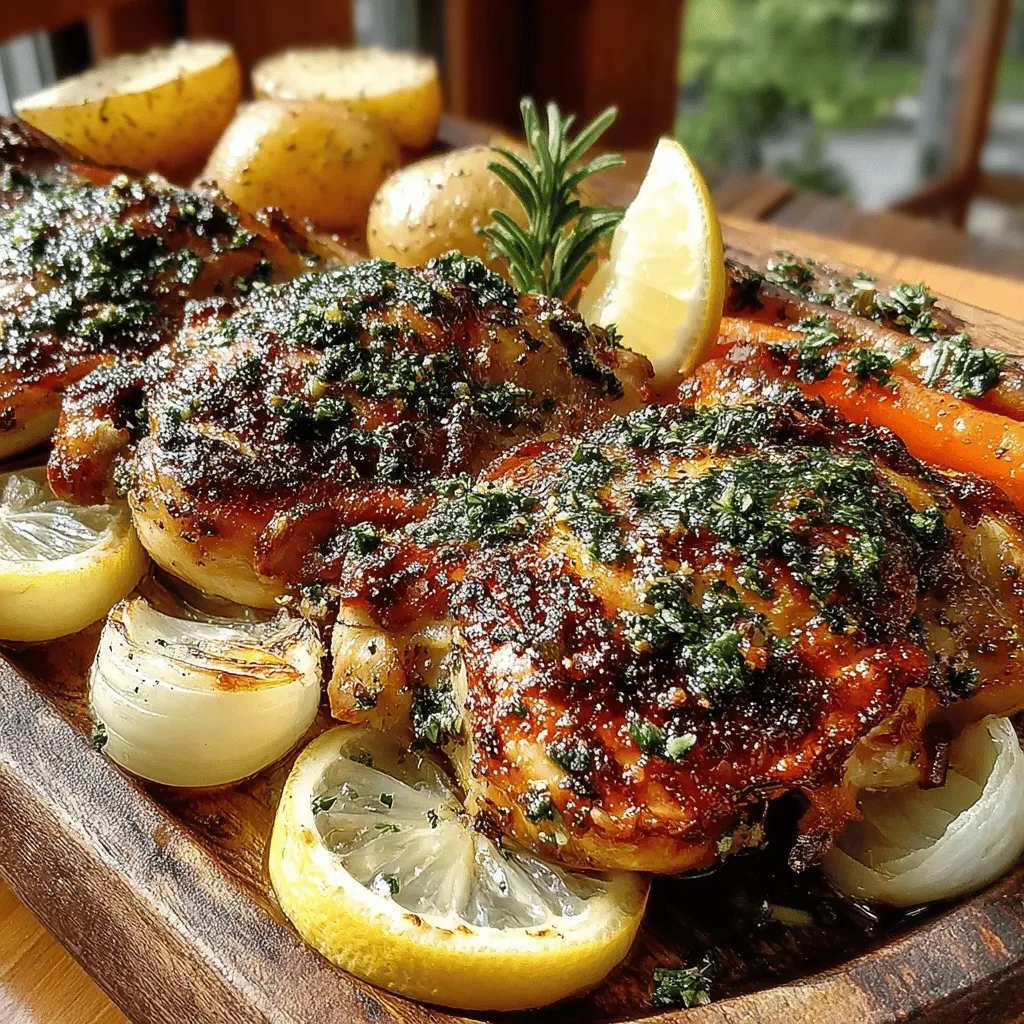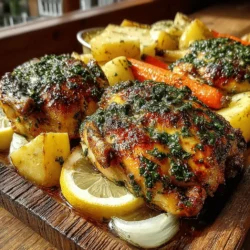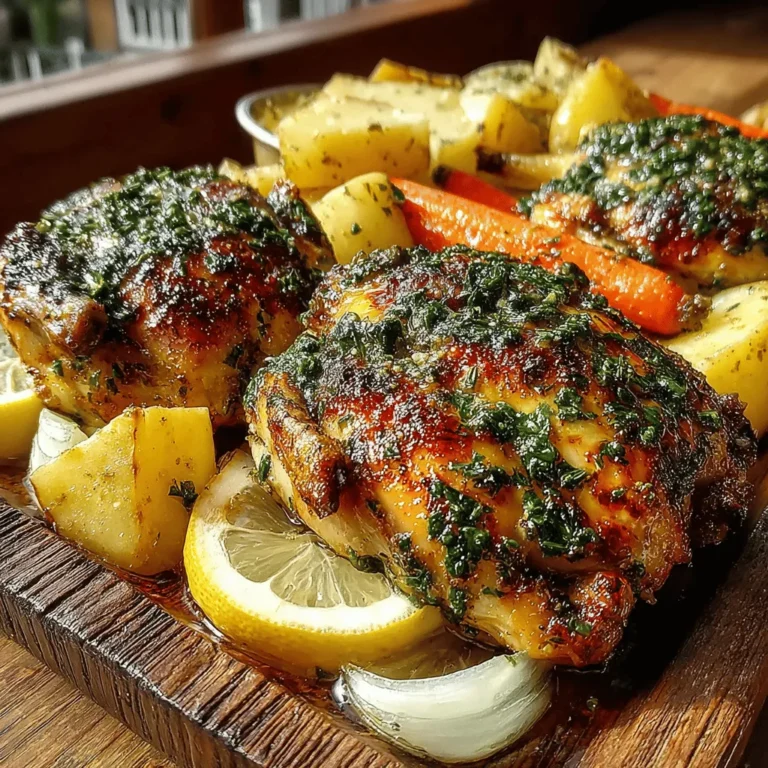Herb Roasted Cornish Hens: An Exquisite Culinary Delight
When it comes to home cooking, few dishes evoke a sense of elegance and comfort quite like herb roasted Cornish hens. These small, tender birds are not only a culinary delight but also a versatile choice for various dining occasions, from cozy family dinners to festive gatherings. Their rich flavor and appealing presentation make them a standout centerpiece that can elevate any meal.
The magic of herb roasted Cornish hens lies in the exquisite blend of fresh herbs that infuse the meat with aromatic flavors. Herbs such as rosemary, thyme, and sage are not just for garnish; they play a crucial role in enhancing the overall taste profile of the dish. The fragrant oils released during the roasting process mingle with the natural juices of the hens, creating a succulent and aromatic experience that is simply irresistible.
This recipe is perfect for special occasions, but it is also easy enough to prepare on a weeknight when you want to treat your family to something extra special. In this article, we’ll guide you through the enchanting world of Cornish hens, share the essential ingredients needed for the herb roasted version, and detail the preparation steps to ensure your dish is a resounding success.
Understanding Cornish Hens
Cornish hens, often referred to as Cornish game hens, are a breed of chicken that is smaller in size compared to traditional broiler chickens. Typically weighing between 1 to 2 pounds, these birds are known for their tender meat and delicate flavor. One of the defining characteristics of Cornish hens is their broad breast, which offers a generous amount of succulent meat that is perfect for roasting.
From a nutritional standpoint, Cornish hens are an excellent choice for health-conscious eaters. They are lower in fat and calories compared to their larger counterparts, making them a leaner protein source. Additionally, they are rich in vitamins such as B6 and B12, which contribute to various bodily functions, including metabolism and nerve function. This makes Cornish hens not only a delicious option but also a nutritious one that can fit into a balanced diet.
The history of Cornish hens in culinary traditions dates back to the mid-20th century when they were bred in the United States from the Cornish chicken breed and other small birds. Their popularity has since soared, especially around holidays and special occasions, where they are often served as an elegant alternative to traditional roast chicken or turkey.
Essential Ingredients for Herb Roasted Cornish Hens
To create the perfect herb roasted Cornish hens, it’s vital to gather the right ingredients that will bring out the best in the dish. Here’s an overview of the primary components you’ll need:
– Cornish Hens: First and foremost, you’ll need one or two Cornish hens, depending on the number of servings you require. Look for fresh hens at your local butcher or supermarket, ensuring they are plump and have a healthy appearance.
– Olive Oil: A key ingredient in this recipe, olive oil not only helps to crisp the skin of the hens but also acts as a carrier for the herbs. It adds a subtle richness to the dish, enhancing the overall flavor.
– Fresh Herbs: The heart of this recipe lies in the fresh herbs used. Rosemary, thyme, and sage are traditional choices that complement the poultry beautifully. Each herb brings its unique flavor: rosemary adds a pine-like aroma, thyme contributes earthy notes, and sage imparts a warm, slightly peppery taste.
– Garlic and Lemon: Garlic serves as a flavor powerhouse, adding depth and a hint of sweetness as it roasts. Fresh lemon juice brightens the dish, cutting through the richness of the hens and providing a refreshing contrast.
– Vegetables: While the main focus is on the hens, the addition of roasted vegetables like carrots, onions, and potatoes not only enhances the meal’s visual appeal but also absorbs the delicious drippings from the hens, creating a cohesive flavor profile.
Preparation Steps for Herb Roasted Cornish Hens
Preparation is key to achieving a perfectly roasted Cornish hen. The first step begins with a thorough rinsing of the hens under cold water. This ensures that any residual blood or impurities are washed away. After rinsing, it’s essential to dry the hens thoroughly with paper towels. This step is crucial, as a dry surface will promote better browning and crispness during roasting.
Next, you’ll create a flavorful herb mixture to enhance the Cornish hens. Begin by finely chopping your fresh herbs—about a tablespoon each of rosemary, thyme, and sage. In a bowl, combine the chopped herbs with minced garlic, olive oil, and a pinch of salt and pepper. This mixture will serve as both a marinade and a rub for the hens.
With your herb mixture prepared, it’s time to season the hens. Gently loosen the skin of each hen by carefully sliding your fingers between the skin and the meat. This creates pockets where you can place the herb mixture, allowing the flavors to penetrate deeply into the meat. Rub the herb mixture generously under the skin and all over the surface of the hens, ensuring they are thoroughly coated.
Once the hens are seasoned, you can prepare the vegetables. Chop the carrots and potatoes into bite-sized pieces and slice the onions into wedges. Place the vegetables in a roasting pan, drizzling them with olive oil, salt, and pepper. The vegetables will not only add texture and flavor to the dish but will also create a beautiful medley to accompany the hens.
At this point, you can arrange the Cornish hens on top of the vegetables in the roasting pan. This setup allows the hens to baste in their own juices while the vegetables roast, creating a harmonious blend of flavors.
Next, preheat your oven to 375°F (190°C) to prepare for roasting. Once preheated, place the roasting pan in the oven and let the magic happen. The hens should roast for approximately 1 hour, or until the internal temperature reaches 165°F (75°C) and the skin is golden brown and crispy.
With the initial preparation steps complete, you are well on your way to serving a stunning and flavorful dish that will impress your family and guests alike. In the next part of this article, we will delve into the roasting process in detail and offer tips for serving and pairing your herb roasted Cornish hens for an unforgettable dining experience.

Techniques for Stuffing the Hens with Lemon
Stuffing Cornish hens with lemon not only enhances their flavor but also helps keep the meat moist during roasting. To start, select fresh lemons that are firm and juicy. Follow these steps for effective stuffing:
1. Prepare the Lemons: Cut the lemons in half. If you want a more intense flavor, you can cut them into quarters. This way, they will release their juices more effectively during the cooking process.
2. Season the Inside: Before placing the lemon halves inside the hens, sprinkle a bit of salt and pepper inside the cavity. This initial seasoning will infuse the meat with flavor as it roasts.
3. Insert the Lemons: Place the lemon halves inside the cavity of each Cornish hen. Ensure that they fit snugly, as this will help to keep the moisture inside the bird while it cooks.
4. Secure the Opening: To prevent the stuffing from falling out during roasting, you can tie the legs together with kitchen twine. This technique will also help the hens maintain their shape and cook evenly.
Preparing the Roasting Pan and Vegetables
The roasting pan plays a crucial role in achieving perfectly cooked Cornish hens. Using a sturdy and spacious roasting pan allows for even heat distribution and provides room for the vegetables that will accompany the hens.
1. Select Your Vegetables: Choose a mix of root vegetables for roasting, such as carrots, potatoes, and onions. These not only add flavor but also absorb the delicious juices from the hens.
2. Cut the Vegetables: Chop the vegetables into uniform pieces to ensure even cooking. Aim for approximately 1-2 inch cubes for potatoes and larger chunks for carrots and onions.
3. Season the Vegetables: In a large bowl, toss the chopped vegetables with olive oil, salt, pepper, and any desired herbs (such as rosemary or thyme). This seasoning is vital for enhancing the flavor of the vegetables, which will soak up the juices from the roasting hens.
4. Arrange in the Roasting Pan: Spread the seasoned vegetables evenly in the bottom of the roasting pan. This will create a flavorful base that will complement the hens as they roast.
Importance of Seasoning and Coating Vegetables for Optimal Flavor
Proper seasoning is key to bringing out the best in both the Cornish hens and the accompanying vegetables. Ensure that you coat the vegetables generously with olive oil and seasonings. The oil not only helps the spices adhere to the vegetables but also promotes caramelization, which adds depth of flavor.
– Use Fresh Herbs: Fresh herbs such as thyme, oregano, or basil can elevate the taste of the dish. Consider mixing herbs directly with the vegetables or using them to season the hens.
– Salt and Pepper: A good amount of salt is essential for enhancing flavors. Don’t shy away from seasoning both the hens and the vegetables adequately.
Cooking Process: Roasting the Hens
Setting the Oven Temperature and Its Significance
Preheat your oven to 425°F (220°C). This high temperature is crucial for achieving crispy skin while ensuring that the meat cooks through. The initial blast of heat helps to develop a golden brown exterior, which locks in the juices.
Step-by-Step Guide on How to Roast the Hens
1. Position the Hens: Place the stuffed Cornish hens on top of the arranged vegetables in the roasting pan. Make sure they are breast side up for even cooking.
2. Apply Additional Seasoning: Before placing the hens in the oven, rub the skin with olive oil and sprinkle with salt, pepper, and your choice of herbs. This creates a flavorful crust.
3. Roasting: Transfer the roasting pan to the preheated oven. Roast the hens for approximately 1 to 1.5 hours, depending on their size. Every 30 minutes, baste the hens with the pan juices to keep them moist and enhance flavor.
Importance of Basting for Moisture Retention
Basting is an essential step in the roasting process. It involves spooning the cooking juices over the hens, which not only keeps the meat moist but also enriches the skin’s flavor. It’s recommended to baste at least twice during the roasting time for the best results.
How to Check the Internal Temperature for Doneness
To ensure the hens are fully cooked, use an instant-read thermometer inserted into the thickest part of the thigh (without touching bone). The internal temperature should reach 165°F (75°C). If the temperature is lower, return the hens to the oven and continue roasting, checking every 10 minutes.
Tips for Achieving Crispy Skin While Ensuring Juicy Meat
– Pat Dry: Before seasoning, pat the hens dry with paper towels. Removing excess moisture allows the skin to crisp up nicely in the oven.
– High Heat: Starting the roast at a high temperature will help achieve that desirable crispy skin. Avoid opening the oven door too often, as this will lower the temperature and affect cooking.
– Resting Time: Once done, let the hens rest for about 10-15 minutes before carving. This resting period allows the juices to redistribute, ensuring juicy meat.
Serving Suggestions for Herb Roasted Cornish Hens
Presentation Ideas for Serving the Dish
When it comes to serving Herb Roasted Cornish Hens, presentation can elevate the meal. Consider the following tips:
– Plating: Serve the hens directly on a large platter surrounded by the roasted vegetables. This family-style presentation encourages sharing and creates a beautiful display.
– Garnishing: Fresh herbs, such as rosemary or thyme, can be used as a garnish. A sprinkle of lemon zest adds brightness and color.
Ideal Side Dishes and Pairings to Complement the Hens
To create a well-rounded meal, consider pairing the Cornish hens with these delicious side dishes:
– Wild Rice Pilaf: The nutty flavor of wild rice complements the herbs and citrus of the hens.
– Garlic Mashed Potatoes: Creamy potatoes provide a comforting side that balances the flavors of the roasted hens.
– Steamed Asparagus: A light and fresh vegetable option that adds color and crunch to the plate.
Wine Pairings that Enhance the Meal Experience
Selecting the right wine can enhance the overall dining experience. For Herb Roasted Cornish Hens, consider these wine pairings:
– Chardonnay: A full-bodied Chardonnay, with its buttery notes and hints of oak, pairs beautifully with the rich flavors of roasted poultry.
– Pinot Noir: This light to medium-bodied red wine offers fruity notes that complement the herbs used in the dish.
– Sauvignon Blanc: The crisp acidity and citrus notes in Sauvignon Blanc match well with the lemon stuffing, balancing the meal perfectly.
Health and Nutritional Information
Breakdown of the Nutritional Content of the Dish
Cornish hens are a lean source of protein, making them an excellent choice for health-conscious individuals. A typical serving of roasted Cornish hen (around 4 ounces) can contain:
– Calories: 240
– Protein: 30g
– Fat: 12g
– Carbohydrates: 0g
Benefits of the Ingredients Used, Focusing on Health-Conscious Choices
The ingredients in this recipe not only provide flavor but also contribute to a nutritious meal:
– Lemons: Rich in vitamin C and antioxidants, lemons can enhance the immune system and support healthy skin.
– Fresh Herbs: Herbs like rosemary and thyme are packed with vitamins and have anti-inflammatory properties.
– Vegetables: The mixed vegetables add fiber, vitamins, and minerals, making this dish not only delicious but also nourishing.
Discussion on Portion Sizes and Serving Suggestions
When serving Cornish hens, a half hen per person is generally a suitable portion size. Accompany the meal with two or three side dishes to create a balanced plate. This ensures everyone enjoys a hearty meal without overindulging.
Conclusion
Herb Roasted Cornish Hens present an exquisite culinary experience, perfect for any occasion, from family dinners to festive gatherings. The combination of juicy, flavorful meat and perfectly roasted vegetables creates a dish that is both satisfying and impressive.
With easy preparation and the ability to wow your guests, this recipe is a must-try. Embrace the ease of cooking Cornish hens, allowing you to enjoy the process as much as the meal itself. Don’t hesitate to experiment with flavors and accompaniments, making each preparation unique.
We encourage you to try this Herb Roasted Cornish Hens recipe and savor every bite. The delightful flavors and inviting aroma will surely make it a favorite in your household!


